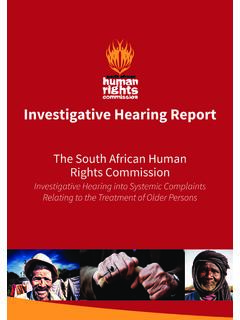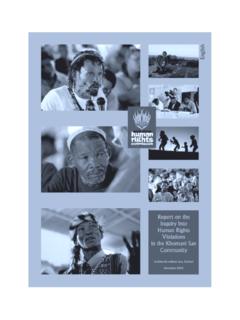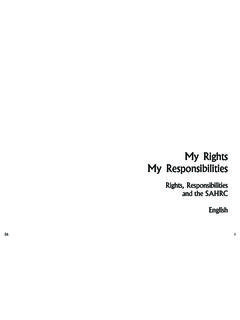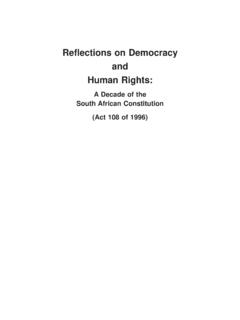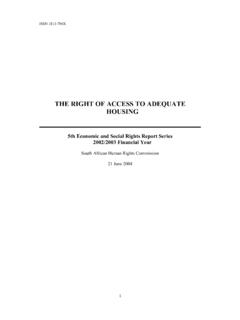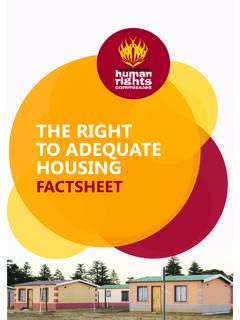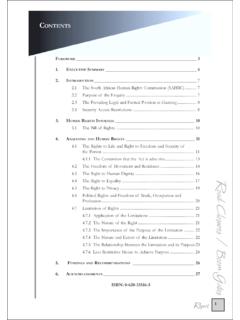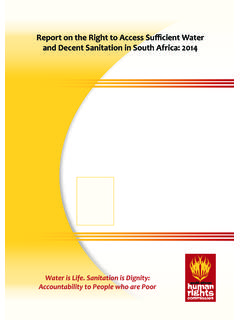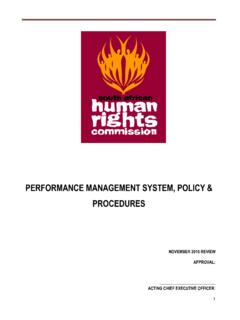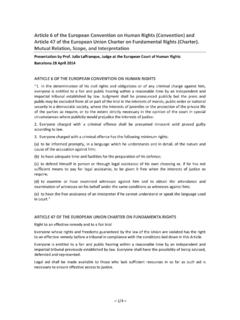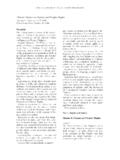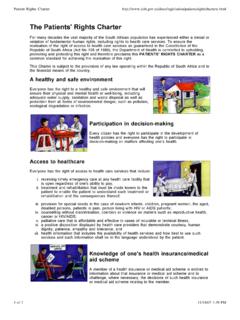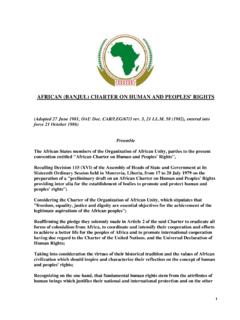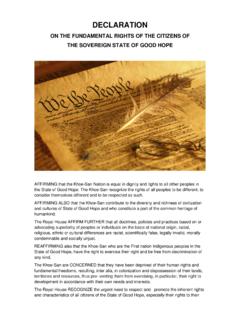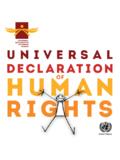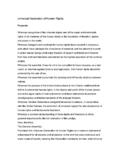Transcription of SAHRC
1 SAHRCC harter of Children s Basic Education RightsThe right of children to basic education2012In the charter there is acknowledgement of the progress that has been achieved by the democratic government in addressing the grossly inequitable and racially determined apartheid education policies. Despite all these achievements, huge challenges remain in this sector, and they impact most negatively on the poor and vulnerable in our society thus reinforcing the existing inequality charter provides a benchmark of where we are in terms of fulfilling the right to a basic education and where we need to go to ensure that every child receives a quality Lindiwe Mokate, South African Human rights Commission, South AfricaThe right to a basic education is a constitutionally protected right that is unequivocally guaranteed to all children in South Africa. It is considered a central facilitative right that is not qualified by expressions such as available resources , progressive realisation , or reasonable legislative measures which are applicable to other socio-economic rights enshrined in our South African Human rights Commission has a constitutional mandate to monitor the realisation of the right to a basic education in South Africa.
2 Monitoring this right has not been made easy by the absence of a common and consolidated statement on the scope and content of the right to basic education. The courts have avoided specifying the content of socio-economic rights , including the right to a basic among human rights practitioners, including academics, identified the Commission as an independent body with the necessary human rights mandate to embark on and lead a consultative process that would culminate in the development of a Right to Basic Education has increasingly been recognised at an international level that national human rights institutions are best placed to determine the monitoring indicators for economic and social rights due to their independent nature and knowledge of local charter is a culmination of an extensive engagement process and research by the Commission and stakeholders. It aims to provide a common legally grounded planning, monitoring and advocacy framework that is child-centred and recognises the inter-connectedness of human rights .
3 Whilst the Commission intends using the charter as a monitoring tool, it can also be potentially used by all relevant stakeholders in their advocacy work. The charter provides a statement of the various obligations of the State to ensure the realisation of the right to basic education; notes key shortcomings and inequities; revisits commitments made to address the gaps in achieving quality education; and the key role-players are charter of Children s Basic Education RightsAcknowledgementsSouth African Human rights Commission charter of Children s Basic Education rights , 2012 The SAHRC Commission wish to express their appreciation to: UNICEF South Africa for their partnership and technical assistance towards the completion of the SAHRC charter of Children s Basic Education rights . Patricia Martin for her assistance in the drafting of the base document. The Minister of Basic Education and the Department of Basic Education for support and inputs.
4 Various stakeholders in the basic education field for the review and inputs into the charter . The staff from the SAHRC for their input and review of the document. South African Human rights CommissionThis publication is intended to support everybody that works in the basic education field in South Africa. All care has been taken to ensure that the information is correct and original sources have been indicated for reference and verification. With an identification of the South African Human rights Commission as source, the document may be freely quoted, reviewed, abstracted, reproduced and translated, in part or in whole, but not for sale nor for use in conjunction with commercial purposes. Original sources should be acknowledged where indicated in the free of charge from:South African Human rights CommissionWebsite: and typesetting: Inkfish Design Studio cc on the cover:Two Girls at a desk: Copyright - UNICEF - R Hearfield 0004 Boy: sticking out tongue: Copyright - UNICEF - G Pirozzi 004 Three girls sitting on the floor: Copyright - UNICEF - G Pirozzi WG9P7490 Three walking girls: Copyright - UNICEF - R Hearfield 0007 Message of Support Aida Girma, UNICEF Representative, South Africa Section 29 of the South African Constitution enshrines the right to education and defines the positive responsibilities of the state in this respect.
5 The section states, Everyone has the right to a basic education, including adult basic education. It is a common assertion that education is the basis for development, and therefore a country like South Africa desiring to foster its development is concerned with the long-term investment in the education of her people as articulated in the Constitution excerpt above. This includes the right to access to education by children with disabilities and investment in early childhood development from birth to school-going age. South Africa is progressing well towards the achievement of the MDG two (universal access to primary education) currently at and at about 89% for transition to secondary education (EMIS 2011). However, there are challenges in the provision of quality education the Annual National Assessment results in 2011 show an average of 35% and 28% pass in literacy and numeracy respectively for Grade 3 learners. As a government South Africa prioritizes education, with education receiving of GDP and 22% of the national budget.
6 The development of the basic education rights charter provides the South Africa Human rights Commission with an invaluable tool to provide oversight and support the monitoring of quality basic education in the South African context. In UNICEF, as articulated by the Convention on the rights of the Child, we are cognizant that the right to education is a fundamental right. Civil, political, economic and social rights can be effectively exercised by individuals when they have received a certain minimum education, without which their access to such rights remains illusory and theoretical. Today, in South Africa as in many other countries globally, we are increasingly faced with serious problems such as: poverty and illiteracy; the widening gap between rich and poor; proliferating acts of violence; and social exclusion, with high numbers of children living below the poverty line. The right to education is invaluable in a bid to eradicate poverty and tackle these challenges.
7 It is my hope that this charter will contribute to renewal of, and re-commitment, to quality basic education for all children in South Africa. SAHRC charter of Children s Basic Education RightsTABLE OF CONTENTSACRONYMS AND ABBREVIATIONS 6 INTRODUCTION 7 1 The SAHRC s mandate 7 2 Basic education: a legal and developmental priority 7 3 The multiple causes of the failure of basic education rights 9 4 Recent developments to better realise the right to education 9 5 Role of the charter 10 6 The scope of the charter 11 7 The 4A legal framework 12 8 The substance of the right: indicators marking progress and success 12 9 Choice of indicators 13 10 SAHRC process for conducting the annual evaluation 13 charter OF BASIC EDUCATION rights 14 1 Available Education 15 2 Accessible Education 34 3 Acceptable Education 44 4 Adaptable Education 50 SELECTED REFERENCES 55 ANNEXURE A: STAKEHOLDERS THAT PARTICIPATED IN THE DEVELOPMENT OF THE charter 57 END NOTES 586 SAHRC charter of Children s Basic Education RightsACRONYMS AND ABBREVIATIONSACRWC African charter on the rights and Welfare of the ChildANA Annual National AssessmentsASIDI Accelerated Schools Infrastructure Delivery Initiative CEDAW Convention on the Elimination of all forms of Discrimination against WomenDBE Department of Basic EducationDHET Department of Higher Education and TrainingDSD Department of Social DevelopmentDPME Department of Performance, Monitoring and EvaluationDOH Department of HealthDHA Department of Home AffairsDWCPD Department of Women.
8 Children and People with DisabilitiesEFA Education for AllFET Further Education and TrainingGDP Gross Domestic ProductICERD International Convention on the Elimination of all forms of Racial Discrimination ICSECR International Covenant on Social Economic and Cultural RightsNCPR National Child Protection RegisterNEEDU National Education and Evaluation Development UnitNEIMS National education infrastructure monitoring systemNRSO National Register for Sex OffendersNSNP National School Nutrition ProgrammePDOU Planning and Delivery Oversight UnitQLTC Quality Learning and Teaching CampaignSACMEQ Southern and Eastern Africa Consortium for Monitoring Educational Quality SADC Southern African Development CommunitySAHRC South African Human rights CommissionSASA South African Schools ActSIAS National Strategy on Screening, Identification, Assessment and Support StrategyUD Universal DesignUDHR Universal Declaration on Human RightsUNCRC United Nations Convention on the rights of ChildrenUNCRPD United Nations Convention of the rights of People with DisabilitiesACRONYMS AND ABBREVIATIONSINTRODUCTION7 SAHRC charter of Children s Basic Education Rightsbetween the right to education and sustainable social and economic development.
9 In addition, they require special and focused measures to secure the education rights of the most marginalised children. More locally, access to quality education enjoys priority status on the national development agenda. Education was identified as an Apex Priority in the 2008 presidential State of the Nation Address; it featured prominently in the National Medium Term Strategic Framework (The Presidency, 2009); and improving the quality of basic education was identified as one of the 12 priority development outcomes on which government will focus between 2010 and 2014 (Department of Basic Education: Delivery Agreement for the Basic Education Sector, 2010). Most recently, the National Development Plan 2030, which maps out South Africa s development trajectory for the next two decades, places quality basic education at the centre of the realisation of the dual national goals of reducing poverty and inequality. It specifically targets improving the quality of education and equalising educational opportunities for children marginalised through apartheid policies, including black African children, girl-children and children with disabilities (National Planning Commission, 2012).
10 1 The SAHRC s mandate The South African Human rights Commission ( SAHRC ) is mandated to:1 promote respect for human rights and a culture of human rights ; promote the protection, development and attainment of human rights ; and, monitor and assess the observance of human rights in the Republic. It has developed the charter of Children s Basic Education rights in South Africa for use in fulfilling this Basic education: A legal and developmental priorityLegal and development instruments recognise basic education as both a fundamental human right and a developmental the legal front, the Universal Declaration of Human rights (UDHR) (1948), the International Convention on the Elimination of all forms of Racial Discrimination (ICERD) (1969), the United Nation s (UN) Convention on the Elimination of Discrimination against Women (CEDAW) (1979), the United Nation s Convention on the rights of the Child (UNCRC) (1989), the Convention of the rights of Persons with Disabilities (CRPD) (2006), the African charter on the rights and Welfare of the Child (ACRWC) (1989), and the Constitution of the Republic of South Africa (1996) recognise the right to basic education.
